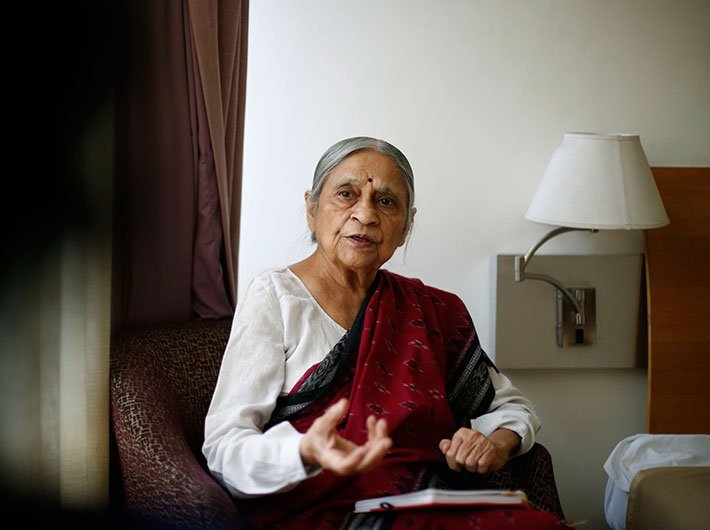SEWA founder Ela R Bhatt provides a localised solution to India’s development challenges
‘anubandhaḿ kṣayaḿ hiḿsām
anapekṣya ca pauruṣam
mohād ārabhyate karma
yat tat tāmasam ucyate’
The shloka appears in chapter 18 of the Bhagavad Gita. The English translation reads as that action performed in illusion, in disregard of scriptural injunctions, and without concern for future bondage or for violence or distress caused to others is said to be in the mode of ignorance.
This is from where Ela R Bhatt, fondly called Elaben, draws her inspiration for her book named ‘Anubandh’. Known as a ‘gentle revolutionary’, she has dedicated her life making the contributions of India’s poor, self-employed women visible and their voices heard. In 1972, she founded self employed women’s association (SEWA), a trade union of more than one million poor women in India.
Anubandh is a concept that connotes a kind of solidarity – a mutual inter-connectedness. In her book, Elaben reiterated the concept as building holistic and mutually beneficial communities that are mindful of the impact that our acts of daily living have on land, and on the people.
It suggests that if the six basic needs of daily life – food, clothing, housing, health, education, and banking can be largely met locally, within a hundred-mile area, people will find diverse and innovative solutions to problems of poverty , exploitation and environment degradation.
In order to understand this idea of correlated development, a lecture and panel discussion with Elaben and other experts who are exploring the concept of interconnectedness (Anubandh) and what it means for India’s development challenges, was held in New Delhi on Wednesday.
“The phrase ‘hundred-mile area’ that I have used in my book is a notion which means localised or decentralised. It is important to understand that our actions have implications, and its impact is very large or wide. It is like oceanic circles. If I drop something, a circle is created, which travels and affects everyone”, said Elaben. We are closely related to each other. We’re conscious of some relations and unconscious of others. “Our source of water is the same; source of storing water is the same and a common land for growing food. This is Anubandh”, she added.
Her growing concern is that of rising violence, starvation and other forms of exploitation. “How can this world, with so much knowledge and resources let a few go to bed hungry?” she asks.
According to her, reducing the distance between the consumer and producer, and the producer and raw materials will empower the people and restore economic and political balance in the world. “By importing food, we cannot solve the problem of food security. The answer lies in the local”, she added.
Answering the question of the moderator regarding changing consumption patterns of consumers, Elaben said, “when you cut the distance between consumer and producer, for essential and primary needs like roti, kapda and makan (food, clothing and shelter), all the problems will be solved. Buying locally will increase employment, provide lower prices and empower people. The trend of milk coming in, in tetra packs with high prices is a consumption pattern. This is unnecessary as the needs can be met locally.” Both consumers and producers are accountable and consumers are not the victims. Consumption patterns are their own choice, she said.
Apart from being accountable to one’s choices, Elaben said that localisation of resources has to be done by the people themselves. The government support will help but not by announcing big schemes that are ultimately implemented poorly. Common people have to plan, decide and put in funds. Let all institutes and research centres do it, it will have a better outcome. “Make it as local as possible. This will make everyone accountable and reduce incidences of corruption”, she said. For her, forced migration is the biggest tragedy. “Students leave their home, land, history and very existence”. They have to make a home elsewhere which is not easy. “If opportunities are built nearby, they don’t have to migrate”, she added.
One of the panellists, Amir Ullah Khan, development and trade economist, policy advisor BMGF, said, “Local markets are the best market. This is because we share the culture. In India, the problem is that we have the best market with the United States, whereas it is almost zero in south Asia. We want our market as far as possible. This is not the case elsewhere.”
Mihir Bhatt, founder and director of All India Disaster Mitigation Institute, said that during the tsunami floods, his team went to Tamil Nadu to provide aid. After talking to the people affected, he found out that the ratio of the value or worth of relief coming in from outside, like government aid and from other agencies to that coming in locally was 1:7. “Relief coming in locally means as simple as neighbours helping each other. Similar ratios are found in other areas too”, he said. Hence, localisation during disaster can help a lot too. Local institutions like schools should have disaster management plans.
Bringing in technology in localisation of skill development, Mahesh Venkateswaran of NSDC said that technology can be used to bring in professionals to teach school dropouts in rural areas about prospective career options. This will enhance the community within themselves. “It is important to change mindsets about professions of labour and plumbers. We have to respect their dignity as they are as important for society as anyone else”, he said. People at the base of the pyramid, who have been seen at the peripheries of development, will now take centre-stage as the key players to build the community. This is the idea of Anubandh.

